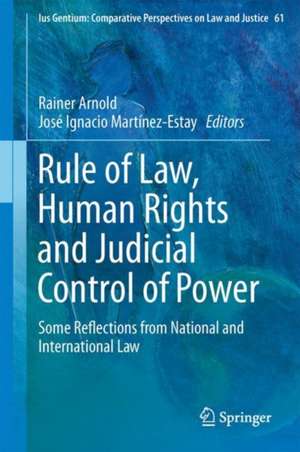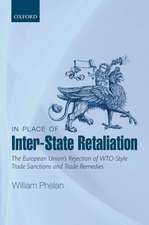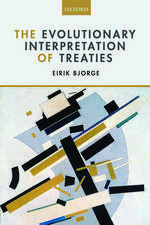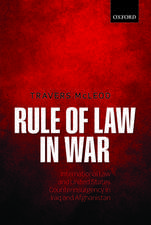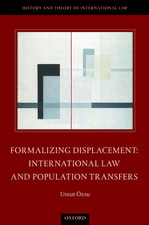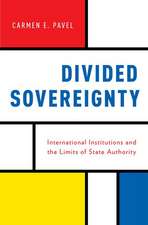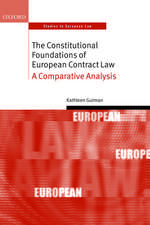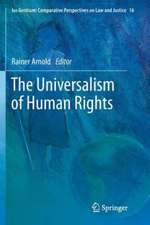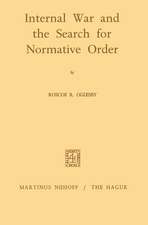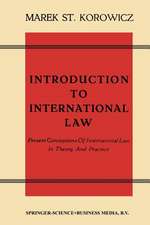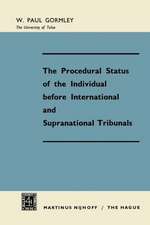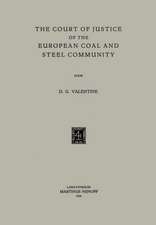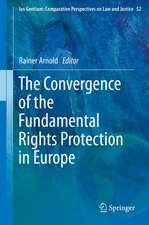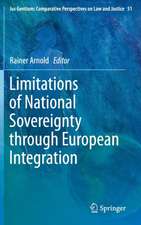Rule of Law, Human Rights and Judicial Control of Power: Some Reflections from National and International Law: Ius Gentium: Comparative Perspectives on Law and Justice, cartea 61
Editat de Rainer Arnold, José Ignacio Martínez-Estayen Limba Engleză Hardback – 23 mai 2017
| Toate formatele și edițiile | Preț | Express |
|---|---|---|
| Paperback (1) | 788.90 lei 6-8 săpt. | |
| Springer International Publishing – 28 iul 2018 | 788.90 lei 6-8 săpt. | |
| Hardback (1) | 1121.76 lei 6-8 săpt. | |
| Springer International Publishing – 23 mai 2017 | 1121.76 lei 6-8 săpt. |
Din seria Ius Gentium: Comparative Perspectives on Law and Justice
- 20%
 Preț: 1128.16 lei
Preț: 1128.16 lei - 20%
 Preț: 1565.18 lei
Preț: 1565.18 lei - 18%
 Preț: 1115.28 lei
Preț: 1115.28 lei - 18%
 Preț: 904.28 lei
Preț: 904.28 lei - 18%
 Preț: 1001.81 lei
Preț: 1001.81 lei -
 Preț: 180.18 lei
Preț: 180.18 lei - 24%
 Preț: 787.31 lei
Preț: 787.31 lei - 18%
 Preț: 1115.28 lei
Preț: 1115.28 lei - 15%
 Preț: 635.31 lei
Preț: 635.31 lei - 18%
 Preț: 1108.67 lei
Preț: 1108.67 lei - 18%
 Preț: 1007.97 lei
Preț: 1007.97 lei - 18%
 Preț: 784.79 lei
Preț: 784.79 lei - 18%
 Preț: 1223.11 lei
Preț: 1223.11 lei - 18%
 Preț: 891.02 lei
Preț: 891.02 lei - 18%
 Preț: 1009.40 lei
Preț: 1009.40 lei - 18%
 Preț: 1005.74 lei
Preț: 1005.74 lei - 18%
 Preț: 1014.89 lei
Preț: 1014.89 lei - 18%
 Preț: 896.70 lei
Preț: 896.70 lei - 15%
 Preț: 641.85 lei
Preț: 641.85 lei - 18%
 Preț: 779.71 lei
Preț: 779.71 lei - 18%
 Preț: 1010.79 lei
Preț: 1010.79 lei - 18%
 Preț: 1010.03 lei
Preț: 1010.03 lei - 18%
 Preț: 950.52 lei
Preț: 950.52 lei - 15%
 Preț: 638.76 lei
Preț: 638.76 lei - 18%
 Preț: 947.50 lei
Preț: 947.50 lei - 20%
 Preț: 564.78 lei
Preț: 564.78 lei - 18%
 Preț: 1115.14 lei
Preț: 1115.14 lei - 18%
 Preț: 939.42 lei
Preț: 939.42 lei - 15%
 Preț: 635.80 lei
Preț: 635.80 lei - 15%
 Preț: 637.59 lei
Preț: 637.59 lei - 15%
 Preț: 643.65 lei
Preț: 643.65 lei - 24%
 Preț: 809.18 lei
Preț: 809.18 lei
Preț: 1121.76 lei
Preț vechi: 1367.99 lei
-18% Nou
Puncte Express: 1683
Preț estimativ în valută:
214.72€ • 233.31$ • 180.48£
214.72€ • 233.31$ • 180.48£
Carte tipărită la comandă
Livrare economică 21 aprilie-05 mai
Preluare comenzi: 021 569.72.76
Specificații
ISBN-13: 9783319551845
ISBN-10: 3319551841
Pagini: 446
Ilustrații: XI, 446 p.
Dimensiuni: 155 x 235 x 25 mm
Greutate: 0.82 kg
Ediția:1st ed. 2017
Editura: Springer International Publishing
Colecția Springer
Seria Ius Gentium: Comparative Perspectives on Law and Justice
Locul publicării:Cham, Switzerland
ISBN-10: 3319551841
Pagini: 446
Ilustrații: XI, 446 p.
Dimensiuni: 155 x 235 x 25 mm
Greutate: 0.82 kg
Ediția:1st ed. 2017
Editura: Springer International Publishing
Colecția Springer
Seria Ius Gentium: Comparative Perspectives on Law and Justice
Locul publicării:Cham, Switzerland
Cuprins
Part I: Rule of Law and Judicial Control of Power.- Chapter 1. Constitution and Judicial Review: Comparative Analysis.- Chapter 2. On the Jurisdictional Control of Acts of the Goverment of Romania.- Chapter 3. Judicial Control of Public Power in Poland.- Chapter 4. To Be, or Not to Be, That Is the Question. The Process of Unconstitutionality Like an Abstract Judicial Review at the Peruvian Constitution.- Chapter 5. Judicial Review and Public Power in Kenya: Revisiting Judicial Response to Select Political Cases.- Chapter 6. Direct Participation of the People in Public Power - Advantages and Disadvantages of a Referendum, Croatian and European Perspective.- Chapter 7. The Role of Civil Society in the Control of Public Power.- Chapter 8. Basic Features of the Constitutional System in Kosovo.- Chapter 9. Role of the Constitutional Justice in Controlling the Balance between State Powers in the Republic of Moldova.- Chapter 10. Judicial Control of Public Power as Legal Instrument for Protection of Human Rights and Fundamental Freedoms in Ukraine.- Part II: Judicial Control, Its Effects and Limits.- Chapter 11. Respect for Judicial Precedent as a Limit on the Exercise of Public Power.- Chapter 12. Reception of the Proportionality Test by Chilean Scholars: A Critical Analysis.- Chapter 13. Constitutional Tribunals’ Judicial Control of Public Power in Poland.- Chapter 14. The Margin of Appreciation of the Albanian Constitutional Court on the Constitutionality of Emergency Decrees of Executive Power.- Chapter 15. The Project of Constitutional Reform in Austria.- Part III: Human Rights and Judicial Control.- Chapter 16. Consensus and the Intensity of Judicial Review in the European Court of Human Rights.- Chapter 17. The Jurisdiction on the Social Rights: A Conflict between the Courts and Public Power in the Italian Legal System.- Chapter 18. Depreciation of State Sovereignty at the Turn of the 21st Century.- Chapter 19. The International Criminal Court as an International Judicial Control of the National Public Power? (The ICC’s Standpoint on the Complementarity Principle in the Prosecutor v. Simone Gbagbo Case).- Chapter 20. Judicial Review of EU Legislation as an Instrument to Ensure Constistency of National and EU Law.- Chapter 21. The Relationship Between Positive Obligations of Incrimination Under the ECHR and the Constitutional Principle of Legality in Criminal Matters in the Italian Legal System.- Chapter 22. Role of the European Court of Human Rights in the Turkish Constitutional Court’s Rulings Regarding the Freedom of Association.- Chapter 23. Beyond the Judicial Control of Public Power: The Horizontal Effects of Human Rights in Chile.
Notă biografică
Rainer Arnold, Dr. Dres.h.c. Professor at the University of Regensburg, in 1979 appointed holder of the Chair of Public Law, in 1999 nominated holder of the Jean Monnet Chair of EU Law and in 2008 holder of the Jean Monnet Chair ad personam „Legal Relations of the EU with Central, Eastern and Southeastern Europe“. Nominated in 2000 hostujíci professor at the Charles University Prague. Corresponding Member of the Academy of Sciences of Bologna, Membre de l’Académie internationale de droit comparé, Fellow of the European Law Institute, in 2008 Fernand Braudel Fellow at the European University Institute, Fiesole/Florence, former Visiting Professor at Universities in Europe (Paris I (Panthéon-Sorbonne), Paris II (Panthéon-Assas), Strasbourg, Toulouse, Rome La Sapienza, Bologna, and other) and in Latin America. Founding member of the International Research Group on Human Rights and Rule of Law.
José Ignacio Martínez is Professor of Constitutional and Administrative Law in the Faculty of Law of the University of the Andes, Chile. Prof. Martínez has been Jean Monnet Chair Holder, and currently serves as Vice Chancellor for Research and Postgraduate Studies at the University of the Andes. Prof. Martínez is author of books and articles published in Chile and other countries. Professor Martínez is a founding member of the International Research Group on Human Rights and Rule of Law.
Textul de pe ultima copertă
Judicial control of public power ensures a guarantee of the rule of law. This book addresses the scope and limits of judicial control at the national level, i.e. the control of public authorities, and at the supranational level, i.e. the control of States. It explores the risk of judicial review leading to judicial activism that can threaten the principle of the separation of powers or the legitimate exercise of state powers. It analyzes how national and supranational legal systems have embodied certain mechanisms, such as the principles of reasonableness, proportionality, deference and margin of appreciation, as well as the horizontal effects of human rights that help to determine how far a judge can go. Taking a theoretical and comparative view, the book first examines the conceptual bases of the various control systems and then studies the models, structural elements, and functions of the control instruments in selected countries and regions. It uses country and regional reports asthe basis for the comparison of the convergences and divergences of the implementation of control in certain countries of Europe, Latin America, and Africa. The book’s theoretical reflections and comparative investigations provide answers to important questions, such as whether or not there are nascent universal principles concerning the control of public power, how strong the impact of particular legal traditions is, and to what extent international law concepts have had harmonizing and strengthening effects on internal public-power control.
Caracteristici
Addresses the problem of the limits of judicial review at both national and supranational levels Brings together a group of European, American and Latin American researchers Examines 15 countries spread over 4 continents Provides insight into the differences and similarities between countries, as well as universal principles Includes supplementary material: sn.pub/extras
